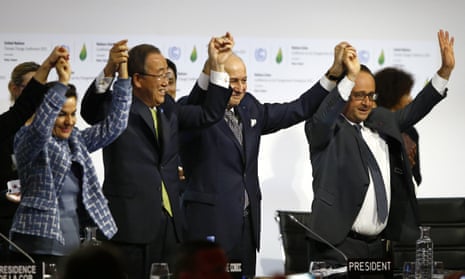Last December, world leaders convened in Paris in an extraordinary effort to find a global solution for reducing destructive carbon emissions – the indisputable driver of climate change – and to prevent our planet from a destructive 2C increase in global temperatures. Today, leaders gather again – this time at the United Nations in New York – to sign the landmark agreement.
Two degrees may not sound like a major threat, or even a difficult goal. But limiting average temperature increase could be the difference in assuring our future. A future that includes breathable air, dependable weather patterns, drinkable water, secure food sources and the survival of the ecosystems on which our climate – and human life – depends.
The Paris agreement was not our first effort at tackling the grave issue of climate change. The summits at Copenhagen, Kyoto and Montreal were each an attempt to pull us back from the brink of disaster. But they came up short. For our moment in history, Paris is a critical breakthrough – but it is also just the beginning. We must build on this foundation, and strive for the even more ambitious limit of 1.5C in the coming years, to avoid catastrophic impacts to those least capable of adapting and potentially losing entire island nations to rising seas.
It is a global obligation to ourselves and to future generations. In order to meet it, our work to deliver on the promise of Paris must follow five basic principles:
1 Reducing and pricing carbon emissions
Emissions reduction is the standard by which climate action must be measured – and only strict limits can help us to avoid the worst impacts of climate change. To drive the reductions at the pace and scale that science demands, we need to implement powerful economic incentives: proven market-based policies that put a price on carbon pollution, make polluters pay for their damage to the climate and reward the innovators and entrepreneurs who develop and deploy cleaner technologies.
2 Accelerating the transition to renewable energy
We possess the technology – right now – to speed up the transition to 100% clean energy use. This is not the stuff of science fiction: clean energy costs have plummeted and installed capacity is expanding rapidly. The enormity of our energy infrastructure means the transition will take time – but make no mistake, it is happening. Renewable energy will help usher in a new era of economic promise and security for people around the world.
Accelerating the transition means divesting from fossil fuel holdings and investing in clean energy solutions. As companies such as Peabody Coal file for bankruptcy protection, investors should factor in the risk of supporting fossil energy. Policies that support clean energy are coming fast and there are profits to be made.
3 Protecting the world’s vital ecosystems
Our planet’s delicate, irreplaceable rainforests and wild oceans are key to a sustainable future for all life on Earth. Without these incredibly diverse places, we will not be able to sustain a steady climate that works as nature intended: to clean our air and regulate global temperature. No science or technology can replace or replicate these unique natural wonders. Safeguarding the world’s forests and oceans is critical to supporting the livelihoods of the local and indigenous communities that depend on them.
4 Taking aggressive short-term action first
An emphasis on long-term solutions and mid-century goals can obscure the fact that the worst effects of climate change may become irreversible if we don’t take aggressive action now. Controlling methane emissions is the single most impactful move we can make to alter the near-term trajectory of climate change. Manmade methane emissions cause one quarter of the increased warming we are currently experiencing.
Yet cost-effective remedies exist: inexpensive technologies can reduce leaks and venting from existing oil and gas systems immediately; and innovative programmes exist to reduce landfill waste, which releases methane as it decomposes.
5 Making our cities global models for sustainability
Over half the world’s population lives in dense urban areas that generate more than 70% of global emissions. Any long-term changes must involve major cities from both hemispheres. Already, many are serving as models. Vancouver, Sydney, Stockholm, and Las Vegas have already committed to using 100% renewable energy in the coming decades. Other cities must follow their lead.
These are real solutions, many of which are already being implemented in parts of the world to great success. It is up to political and community leaders, businesses, and citizens everywhere to act as guardians not just of this new, aggressive set of standards for climate action – but as guardians of our future.
We know what needs to be done. Together, we must stand up and fight for these meaningful, effective solutions. Failing to do so will unjustly leave our children a world that is hotter, less diverse and more violent and unjust – all things we can avoid with bold action now.










